In this article, you will get a complete list of different types of keywords in SEO, that will make you easily understand each type of keyword to target your audience as per your requirements.
Keywords in SEO are crucial and play a significant role in making your website rank higher on Google and making it visible to your target audience.
Suppose you are aware of different keywords in SEO, then you can implement different strategies by targeting the right keywords. And you will be ahead of your competitors.
So I have covered different types of keywords with examples in this article, that will help you to make your keywords strategy more powerful according to your target audience.
So without wasting a minute, let’s dive in.
What are Keywords In SEO?
Keywords are the words or phrases, people/users enter in the search box on search engines like Google to find the information they are looking for.
When a user searches a particular keyword on search, the search algorithms try to find and return the best pages from the web related to the keyword used by the user.
And to give you some more clarity, Keywords are related to marketers or SEO professionals and website owners like us, but not related to people who commonly search on Google.
People don’t know about keywords, they only come to Google to type their query and find the information related to that query.
Read: why is keyword research important for SEO here!
How Many Types of Keywords in SEO
There are 17 different types of keywords in SEO, And you must be aware of which keyword to target for your business or website. Basically, SEO keywords are categorized into 4 main types as mentioned below. And these 4 main categories will be
- SEO Keywords by Length
- SEO Keywords by Intent
- SEO Keywords by Role
- SEO keywords by Target
And these 4 main categories will be sub divided into 17 types of keywords as shown below in the image.
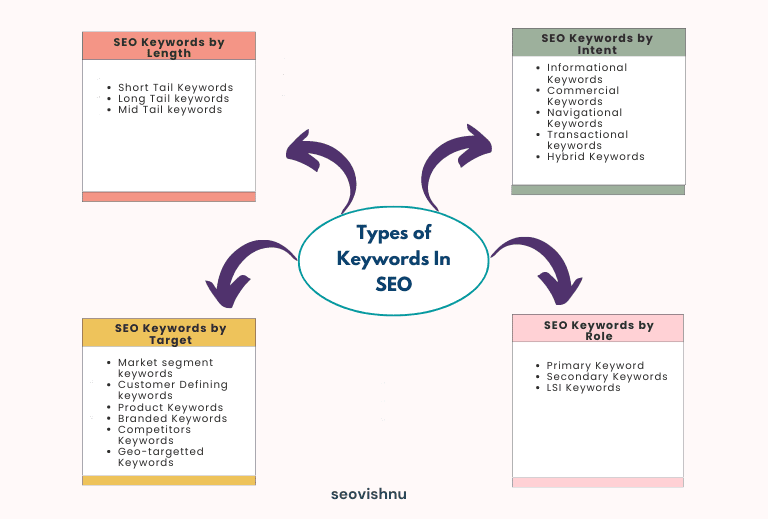
Now, Let’s see each type of keywords with example.
1. SEO Keywords by Length
In this category, the keywords are considered based on length. These keywords are further subdivided into 3 parts.
- Short-tail keywords
- Mid-tail keywords
- Long tail keywords
Short-tail keywords
Short tail keywords are also known as the broad, head, or generic keywords with 1-2 words. These keywords are usually cover broad information but not specific to a particular topic.
The short tail keywords will have huge search volume and are also highly competitive to target them to rank on Google.
Example: “diet plan” or “weight loss”
For example, if someone searches for a “diet plan” the searcher’s intent is not specific. They might be looking for a diet plan for children, a diet plan for weight loss, a diet plan for weight gain, a diet plan chart, etc.
So, these head terms will have a low conversion rate because they are broad and not specific and will also have a huge search volume.
Mid-tail Keywords
Mid-tail keywords are also known as body terms with 2-3 word phrases. These keywords are usually more specific than short-tail keywords.
These keywords will have decent search volume and less competition to target when compared to short-tail keywords.
Example: “ diet plan chart” or “weight loss drinks”
From the above examples, these keywords are specific according to searcher intent, and you can understand what search intent to target and create content according to those terms.
These keywords stand between both with less competition than short tail keywords and high competition than long tail keywords.
Long-tail Keywords
Long tail keywords are long terms with 3-4 plus words phrases. These keywords are usually more specific than both short-tail and mid-tail keywords.
These keywords will have low search volume and low competition to target when compared to other keywords.
Example: diet plan for weight gain, weight loss tips at home
These keywords are specific and help you easily understand the searcher’s intent, And targeting and creating content on long tail keywords helps you rank on Google easily.
And also, having low competition and specific terms, when you rank for these keywords, the conversion rate will be high when compared to other keywords.
So, between short tail and long tail keywords, always target long-tail keywords at the beginning, and later once you get some authority, you can focus on short-tail or mid-tail keywords.
You can refer to the below graph to get more clarity.
2. SEO Keywords by Intent
The second category in SEO types of keywords is keywords by Intent. These keywords are considered based on user search intent behind typing these keywords on Google.
This category keywords by intent are further divided into 4 parts.
- Informational Keywords
- Commercial Keywords
- Navigational Keywords
- Transactional Keywords
- Hybrid Keywords
Informational keywords
Informational keywords are keywords that are based on information intent. Here, the user intent behind these keywords will be to find information about a particular topic.
These keywords are used when the user is in the awareness phase to know the information about any specific topic.
These types of keywords start with words such as how, what, why, etc with other words and phrases in search.
Example: How weight loss helps diabetes, why mental health is important
Commercial Keywords
Commercial keywords are keywords that are based on investigation intent. Here, the user intent behind these keywords will be to investigate a particular product or service.
These keywords are used when the user is preparing to buy something.
These type of keywords starts with words like best, compare, review, etc with other words and phrases.
Example: Best supplements for weight loss, user reviews of Samsung m31
Navigational Keywords
Navigational keywords are those when the user intent is to visit a particular website or place. Here the users are already aware of what they want and what they looking for, to find the specific place or site.
These navigational keywords are used by people when they want to go to a specific site or a place (any specific site name or location).
These keyword types in SEO are included with location names, website names, with other terms in the search.
Example: Kgf movie on amazon prime, second-hand cars in Hyderabad cars24
Transactional Keywords
Transactional keywords are phrases people use when they are in the conversion phase and ready to buy.
The user search Intent behind these keywords will be to take action to buy something.
These keywords included buy, cheap, online sale, etc, with other terms in the search.
Example: buy weight loss supplements online, cheap laptops for students in India
Hybrid keywords
The hybrid keywords are a combination of both navigational and transactional keywords.
Here, the user intent will be specific to buy something from the specific website, and these keywords are dual in nature.
Example: Buy WordPress Course from Udemy
From the above example, the user intent is to buy a WordPress course, which means doing transactions from a specific website called Udemy.
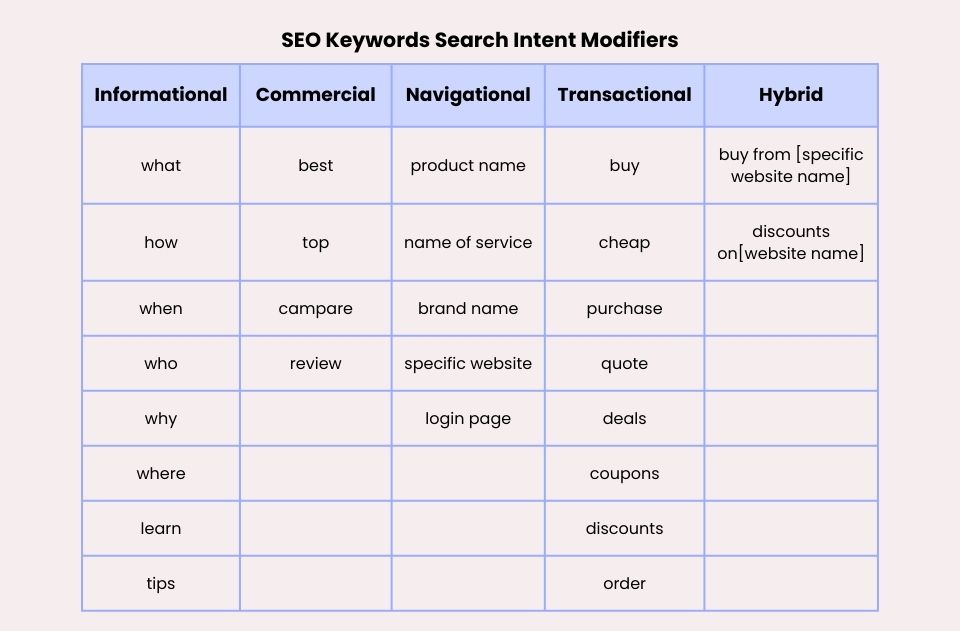
Also read which on-page element carries the most weight for SEO here!
3. SEO Keywords by Target
These category types of keywords in SEO are also known as targeting keywords. Targeting keywords are nothing but, which particular segment you want to target. These keywords are further divided into 6 parts.
- Market segment keywords
- Customer defining keywords
- Product Keywords
- Branded Keywords
- Competitors Keywords
- Geo-targetted Keywords
Market segment keywords
These keywords are generic keywords that are associated with an industry or business.
The words or phrases used by users are broad and target an industry or particular niche market business.
Example: sports shoes
Customer defining keywords
As the name says, these keywords are related to specific types of customers in an industry. This keyword refers to the demographics of customers, such as age, gender, profession, etc.
These search terms will identify a specific subset of customers or audiences to target in your business.
Basically, customers use these words or phrases to define themselves while searching on Google.
Example: sports shoes for men, sports shoes for women, etc
Product keywords
The product keywords directly refer to a company’s product or services. These words or phrases are related to specific brand offerings.
And, these types of keywords help you to target and reach specific audiences who need specific products and also help to generate high CTR and conversion rates.
Every brand should identify and have a keyword strategy for each product and service, so it will be easy for customers and prospects to find their offerings through search.
Example: Adidas ultra boost
So, targeting your product keywords will help to promote your product offers in your business for those specific market customers.
Branded Keywords
These keywords are included with specific brand names or other branded terms.
The people will include the brand name along with a product type, or only the brand name, or only the product name while searching on Google.
Example: Nike sports shoes
Competitors keywords
As the name says, competitors’ keywords are researching on your competitors to find what keywords they are using or ranking on search related to your product or service business.
It’s very important and beneficial for a brand to research competitor keywords because it allows the brand to attract a similar type of interested audience.
Here, you will target brand names of your competitor’s businesses, products, or services keywords to outrank them.
For example: for Adidas, a competitor keyword could be “ Nike sports shoes”
Geo-targeted keywords
Geo-targeted keywords are particular to location specific. These search phrases identify products or services within a specific location.
To give you some more clarity, the searchers who use these word phrases are looking for results that are near them, local city/area.
These keywords are beneficial for local businesses to target a specific audience to drive traffic to their site as well as foot traffic to the store.
Example: teeth whitening dental clinic in Hyderabad
Also Read: Search Engine Optimization advantages and disadvantages
4. SEO Keywords by Role
These category types of keywords in SEO are usually chosen as per the usage of keywords in your content. These keywords are further divided into 3 parts.
- Primary Keywords
- Secondary Keywords
- LSI Keywords
Primary Keyword
The primary keyword in SEO can be considered as the focus keyword. It is the keyword that you want to target as the main keyword on your webpage.
Each page of SEO Content should have one primary keyword assigned to it.
Example: gardening gloves
Secondary Keywords
Secondary keywords are words or phrases that are very closely related to your primary keyword.
When you use secondary keywords in your content, search engines like Google can easily understand the page’s context.
And, if you cover in-depth or different aspects of a topic in the content, it will help to rank higher on the search engine results page and also helps users to understand the entire topic in your web page without further moving to the different web page.
Example: how to clean gardening gloves
LSI Keywords
LSI “Latent Semantic Indexing” is a system that allows Google to identify other keywords surrounding the primary keywords
LSI keywords are words or phrases that are semantically related or variations of primary keywords.
These LSI keywords support the primary keyword in your content to make the page strong in the eyes of Google.
Example: For digital marketing “ the LSI keywords will be meaning, services, examples, types, etc.
And every webpage of your website should have one primary keyword, five secondary keywords, and two to three semantically related keywords because that gives additional weightage to the page.
And to give you more clarity on LSI keywords here below is an image from backlinko you can refer to get more clarity.
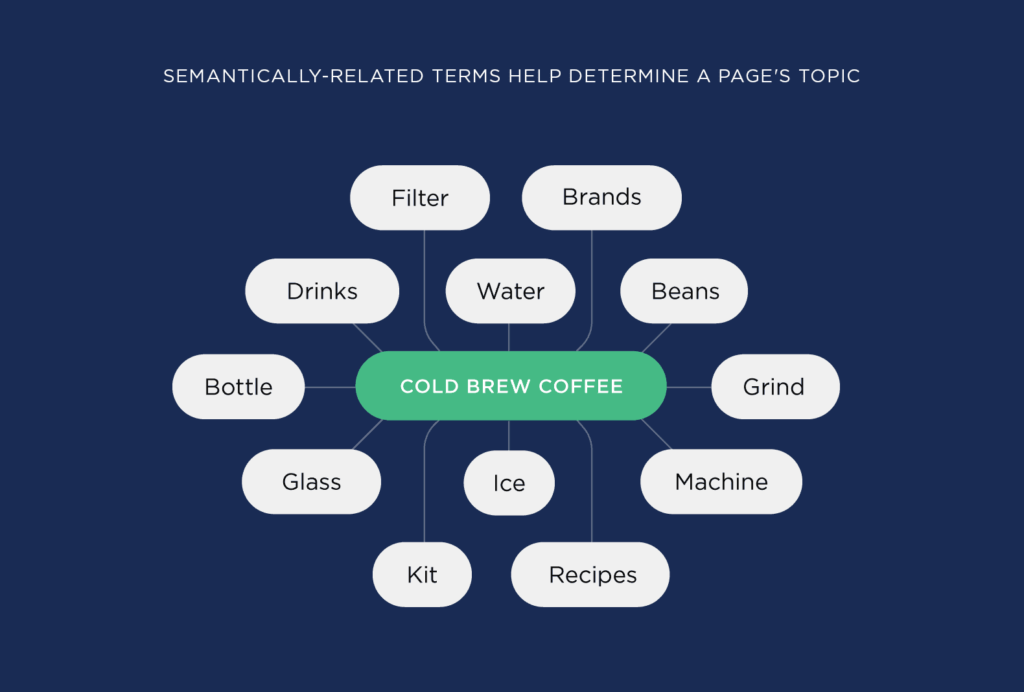
Read SEO and Digital Marketing differences here!
Why Keywords are Important In SEO?
Keywords are essential in SEO because they help you to reach your target audience who are in search of related to your business or niche.
The first thing that you should need in SEO, choosing the right keywords and creating quality content using those keywords, which helps to rank higher and drive traffic to the site.
Keywords also help search engines understand what the page is all about and help to rank higher on Search Engine Results pages for a particular query.
The keywords on your pages should be relevant to what users are searching for, so that there is a better chance people will find your content among the top results.
As a website owner or SEO person, you need to do keyword research and find the keywords to optimize your website to rank at the top of Google SERP(search engine results page) for specific keywords.
When you rank on SERP by using relevant keywords, there will be massive traffic to your site. That traffic might easily convert into leads or customers because they are likely interested in your product or service.
Apart from all your SEO strategies it is important to choose the right keywords to get visibility on Google and drive traffic to your website.
Conclusion
In SEO, keywords are very important and they are first priority for your website to rank on Google. And it is mandatory to know which keywords you must target according to your target audience.
SEO keywords are words or phrases that people type on search engines to find related information. And we have covered all 17 types of keywords in SEO on the page.
Now it’s your turn to prepare your content and use them strategically in your content to rank on the search engine results pages.
And now you know about different SEO keyword types, the next thing you need to find the keywords by doing research as per your target audience.
I hope you’re familiar with finding keywords, if not I have covered an article on how to do keyword research to find keywords in different places for your business.
I hope this article provided you with great information and value, share your thoughts or ask your queries in the comments. I like to read them and reply.
Thanks for your time. See you again in another new article.
FAQs
How many types of keywords are there in SEO?
There are 4 types of keywords in SEO. These 4 types of keywords are further subdivided into 17 types of keywords.
How many keywords are good for SEO?
You need to target one primary keyword, one secondary keyword, and two to three LSI keywords on the page to optimize for SEO.
Are keywords important for SEO?
Yes, Keywords are very important for SEO, and it is the first process in SEO is to find keywords according to your target audience. If you target the wrong keywords entire SEO process will be a waste of time.
Which keywords are best to target in SEO?
There are no best keywords in SEO to target. You need to choose keywords as per your business requirements and target audience as per search volume and difficulty of keywords.
What is a long-tail keyword in SEO?
Long tail keywords in SEO are very much important if you want to build your website authority very fast. Long tail keywords are the longest search terms with 3-4 plus words.
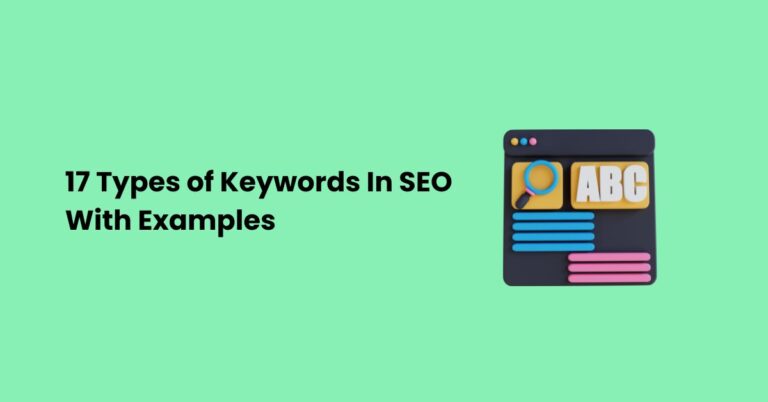
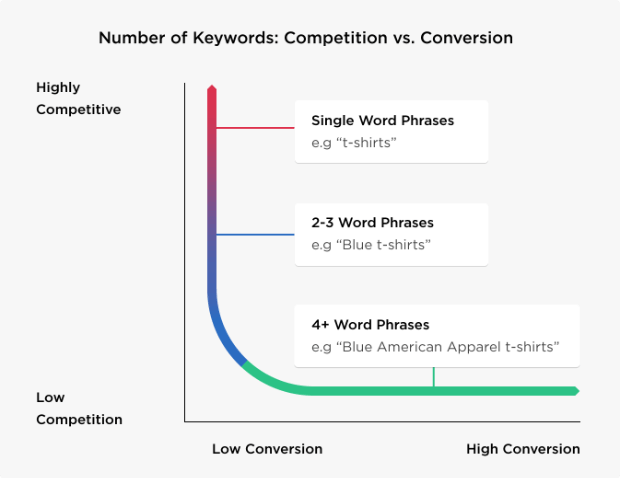
Thanks a lot ,,,After Neil Patel you are Best One In Entire India of Teaching Digital Marketing to Next Levels,,,We are Very much glad to inform taking Digital Marketing Students to Uphill in Mountains ⛰ Like Everest 👍
That means alot to me, We cannot compare with Neil Patel, he is one of the expert. And I am here to share my knowledge with people and help them in their journey of SEO and Blogging. Thankyou for appreciation and I wish I deliver more value to you in coming days.